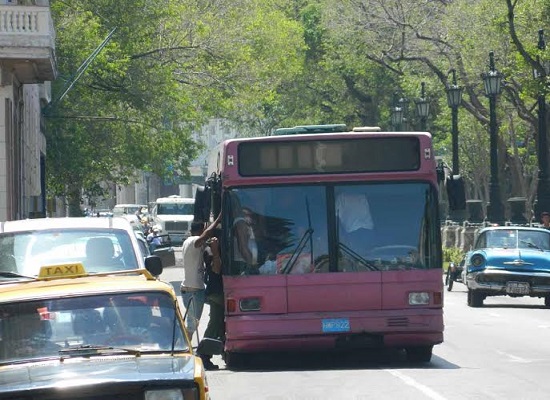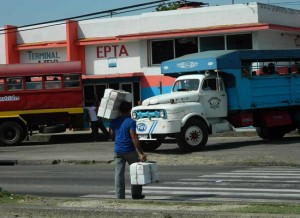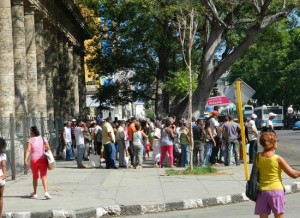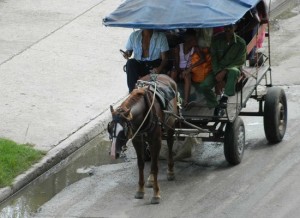
 Cubanet, Ernesto Perez Chang, Havana, 7 February 2015 — More than a decade has passed since the first big purchase of busses from China and Russia was made in order to ameliorate the transportation problem in Cuba, and no improvement is in sight. Contrary to what was promised then, moving from one point to another becomes each day a greater agony for low-income citizens.
Cubanet, Ernesto Perez Chang, Havana, 7 February 2015 — More than a decade has passed since the first big purchase of busses from China and Russia was made in order to ameliorate the transportation problem in Cuba, and no improvement is in sight. Contrary to what was promised then, moving from one point to another becomes each day a greater agony for low-income citizens.
Although officials from the Ministry of Transportation continue blaming the economic embargo and the world crisis for all the difficulties they face, it is well known that there are other phenomena, many of them related to corruption.
In that sense, it is not surprising to encounter silence in the official media and in the statements by some officials in which they try to hide the million-dollar embezzlements that the importing and transportation companies must confront every year such that what is invested on one side passes to the pockets of a few on the other.
Besides the negative figures supplied by Ricardo Chacon, Director of International Relations for the Ministry of Transportation (MITRANS), in the press conference held in 2014 in order to “denounce the embargo,” there were other data missing about the damages caused to the Cuban economy by the frauds and thefts committed by some of the senior leaders of strategic enterprises related to transportation.
According to what we could learn through an official from Havana’s Provincial Transportation Department, who for obvious reasons has asked our discretion as far as his identity, a great part of the economic losses that were suffered last year, as in years before, is due to the chaos and the embezzlement of great sums of money by senior leaders of enterprises like Transimport, whose director, Jesus Jose de Hombre, was arrested some months ago and is under investigation for an act of corruption that also involves the director of the company Autopartes, tied to the illicit sale of thousands of engines that were intended for public transportation.

On the streets of Cuba it is common knowledge that the black market for parts and vehicles, as well as for all services related to the field, is supplied by a network of corruption that reaches the highest levels in government institutions. The inability to honestly administer all these enterprises that function as true mafias is obvious when the constant resignations by officials are taken into account, the frequent changes of high managers as well as of the ministers and vice-ministers related directly or indirectly to transportation but, also, when it is revealed to us the exaggerated price of a vacant position in any of the warehouses or offices related to the sale or import of automobiles and auto parts.

A worker – whom we do not identify for his safety – for one of the warehouses of the Gaviota enterprise group, in the capital, tells us about this particular:
“The job as assistant to the Warehouse Chief goes for a thousand dollars and those that have to do with marketing also are “nibbling close.” There are people here who have entered on the bus and left in a Hyundai. They enter without a peso in their pockets because of what they had they spent on buying the job but later they get twenty times what they invested. Here I have seen new cars being removed, just arrived through the port. Later old cars are put out to rent, as if they were the new ones.”
All of the old trucks and cars that circulate through the city, above all those dedicated to the particular business of transportation, are known to get their spare parts in mechanisms of the dark market due to the absence of legal providers. It might seem like a miracle that cars in use for more than half a century still continue rolling on the country’s highways but a glance inside of any of them would dispel such amazement.
The driver of an almendron (a 1950s American car for hire) says about the expenses that keeping those vehicles functioning implies that necessity has become part of the urban profile.
“You have to go out and look for all the parts. As there are none, they stab you with the prices. If you want to have it running at least eight hours, so that the business pays you, you know that in a year or two you are going to have to “re-motorize yourself.” Every week you have to give it maintenance so that it doesn’t die and adapt all kinds of parts. And none of it is legal, they all require papers and you pay this and that and the other so that everything comes out okay. Everyone who has a car rolling on the street has to make an arrangement if you don’t want to forget about the car. The State requires you to go to the black market because it doesn’t give you anything. They know what they are doing and they have seen a windfall in that. He who makes the law makes the trap.”

Even though for the foreign visitor it could all work wonderfully – given that they travel the best routes of the country in comfortable panoramic buses and not in horse drawn carriages or unsafe trucks like those at the Lido terminal in Mariano – the transportation outlook on the island is quite grim. There is no way to break that cycle of corruption that the government itself has created and not because of inability or innocence. So many years committing the same mistakes only points to something quite high, at the head of the State, someone knows how to finish that infallible refrain that seems the slogan of every social project: There’s good fishing in troubled waters.
About the author:
 Ernesto Pérez Chang (El Cerro, Havana, June 15, 1971) Writer. Graduate of Philology from the University of Havana. He studied Galician Language and Culture at the University of Santiago de Compostela. He has published these novels: Your Eyes Face Nothing (2006) and Alicia Under Her Own Shadow (2012). At the end of this year the outlet Silueta in Miami will publish his most recent novel, Food. He is also the author of books of stories: Last Pictures of Mama Nude (2000); The Ghosts of Sade (2002); Stories From Headquarters (2003); Variations on the Illiterate (2007), The Art Of Dying Alone (2011) and One Hundred Lethal Stories (2014). His narrative work has been recognized with the prizes: David de Cuento, the Union of Writers and Artists of Cuba (UNEAC), in 1999; Gazette Story Prize of Cuba on two occasions, 1998 and 2008; Julio Cortazar Latin American Story Prize in its first call in 2002; National Critic’s Prize in 2007, Alejo Carpentier Story Prize in 2011, among others. He has worked as editor for numerous Cuban cultural institutions such as the House of the Americas (1997-2008), Art and Literature Editorial, the Center for Research and Development of Cuban Music. He was Editor in Chief of the magazine Union (2008-2011).
Ernesto Pérez Chang (El Cerro, Havana, June 15, 1971) Writer. Graduate of Philology from the University of Havana. He studied Galician Language and Culture at the University of Santiago de Compostela. He has published these novels: Your Eyes Face Nothing (2006) and Alicia Under Her Own Shadow (2012). At the end of this year the outlet Silueta in Miami will publish his most recent novel, Food. He is also the author of books of stories: Last Pictures of Mama Nude (2000); The Ghosts of Sade (2002); Stories From Headquarters (2003); Variations on the Illiterate (2007), The Art Of Dying Alone (2011) and One Hundred Lethal Stories (2014). His narrative work has been recognized with the prizes: David de Cuento, the Union of Writers and Artists of Cuba (UNEAC), in 1999; Gazette Story Prize of Cuba on two occasions, 1998 and 2008; Julio Cortazar Latin American Story Prize in its first call in 2002; National Critic’s Prize in 2007, Alejo Carpentier Story Prize in 2011, among others. He has worked as editor for numerous Cuban cultural institutions such as the House of the Americas (1997-2008), Art and Literature Editorial, the Center for Research and Development of Cuban Music. He was Editor in Chief of the magazine Union (2008-2011).
Translated by MLK
